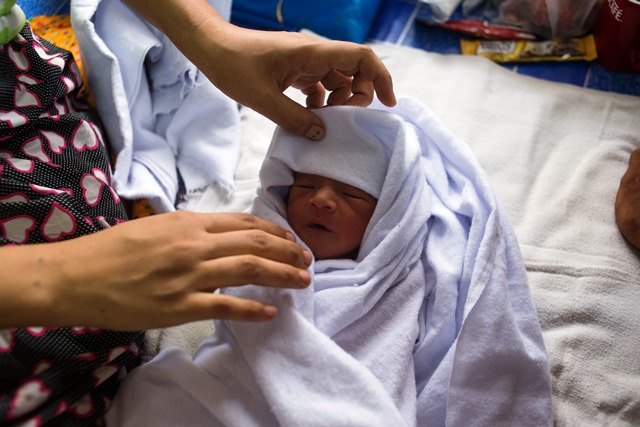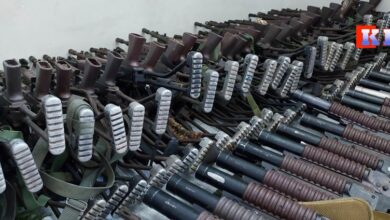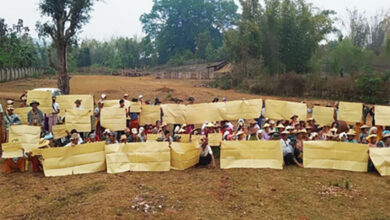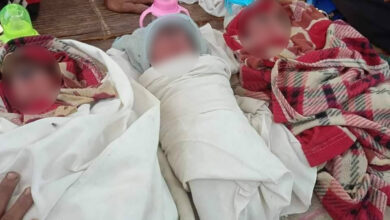On Thai-Burma Border, Young Mothers Struggle to Raise New Lives

A row of young women lie next to their newborn babies at Mae Tao Clinic’s Reproductive Health In-Patient ward on the Thai-Burma border. Most of the 42 women are young migrant workers, in their late teens or early twenties, and earning barely enough to live on, they wonder how they will be able to afford to raise a child.
One of the new mothers, Zin Mar Oo, 22, gave birth to a baby boy the previous night. She works at a ceramics factory in Mae Sot and earns 150 baht ($5) for a days work.
“Our living standard is really low, and it is especially difficult for young parents because we have new costs with children, like food and clothing,” she says, gently wrapping her son in a small blanket, “we only just have enough for ourselves as it is – we work and work to survive but we can never move up.”
Zin Mar Oo, who never went to school, said she desperately wanted her son to get an education.
“We have many concerns for our son as young parents, like ensuring his health and what we can do for him, but my dream is that he can get a good education.”
The Reproductive Health In-Patient coordinator at MTC, Mu Mu Htoo, sits down on a plastic chair in the middle of the ward and explains the challenges young migrant mothers face.
“We have a huge number of cases, more than 3,000 babies were born last year and this year is even busier and it seems like this year there are more cases. Sometimes if a mother has a premature birth or the baby is very small, like 900 grams, she needs to stay here at the clinic for months at a time. The partner has to go back and work while the mother is here, sometimes she finds that he has left her when she goes back or they split up,” she says, “young mothers sometimes have to leave their babies here because they simply cannot afford to have the child, as heartbreaking as it may be for them.”
According to World Bank figures, 200 women in Burma die per 100,000 live births, in neighbouring Thailand the figure is 26.
In April alone MTC Reproductive Health In-Patient ward had 269 patients, 10 of whom had to be referred to Mae Sot General Hospital with serious health problems. Six women needed blood transfusions that month, 18 with complications from post abortions, 34 required antibiotics to combat serious infections and 10 women had post-pregnancy haemorrhaging.
Of serious concern is the growing number of women coming in with complications from backstreet abortions – last year MTC treated 658 women for post-abortion complications, three times as many than in 1998.
“We are finding that women are having abortions at home or in back street clinics and then coming to MTC with health complications from the abortions which include severe fevers, blood loss, septicaemia [blood poisoning], cervical trauma, perforation of the uterus and haemorrhaging.”
Mu Mu Htoo said that in 2013 at least one woman died at MTC because of a botched abortion.
“They don’t just use pills, sometimes the person uses an stick implement to induce the abortion. The risks of this method for the health of the mother are very high.”
Abortion in Thailand is illegal with few exceptions. Article 305 of the Thai Penal Code states that abortion is illegal except when pregnancy endangers the health of the mother, or when the pregnancy is due to rape or incest. Naw Ree, supervisor of MTC’s Reproductive Health Out-Patient Department said that this left migrant mothers in a difficult situation.
“Mae Sot is not Chiang Mai or Bangkok, where you can find safe places to have an abortion. There is only one doctor in Mae Sot performing abortions at Mae Sot General Hospital and that is under the strict regulations of current Thai Law,” she says in her small office, “ So because these women cannot go to Chiang Mai, they get backstreet abortions.”
Naw Ree confirmed to Karen News that women can face risks to their life because of the current situation, “pills are very expensive, maybe one or two thousand baht for one pill. So that is why some women have backstreet abortions.”
Ye Wai, 35, had no good options. Falling pregnant, she decided to have an abortion and took a local Burmese drug, named ‘Kaythipan.’ The drug worked but afterwards she could not stop bleeding – she was unable to get treatment for 20 days while she became weaker and weaker.
“This is the second time I had an abortion, I want to have more children but my situation is currently too bad to raise more children,” she says lying on a bed in MTC while getting a blood transfusion.
“My family earns 250 baht per day, I have two children, and the oldest is 15 and already works at a factory for 100 baht a day. It is too difficult to raise another child.”
“Her haemoglobin count was very low – just 7.9, this is extremely serious.” Mu Mu Htoo says.




